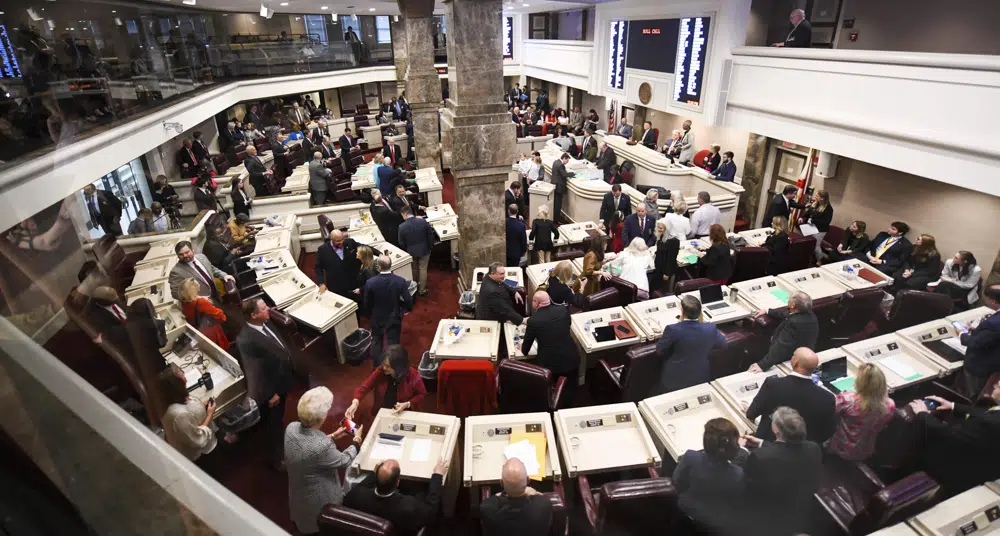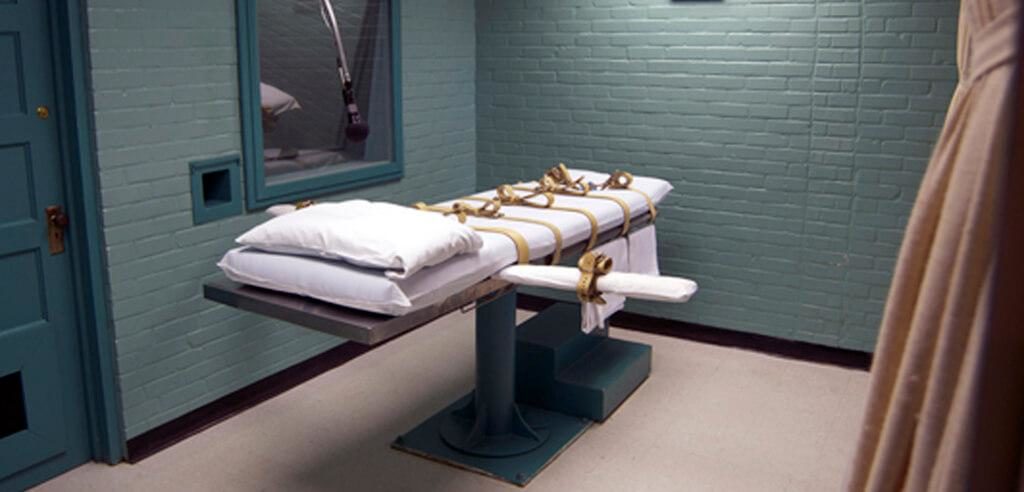House passes legislation so drug dealers can be charged with manslaughter in overdose deaths

On Thursday, the Alabama House of Representatives passed legislation allowing prosecutors to charge a drug dealer with manslaughter if they provide a controlled substance that causes someone to die. House Bill 82 (HB82) was sponsored by State Representative Chris Pringle. Pringle explained that he had friends in Mobile who mortgaged their house, mortgaged everything they had to pay for their son to get through rehab. His drug dealer stalked him. The drug dealer kept calling him, followed him to Narcan on meetings, and even lied to his mother to get his number. Finally, he broke him down. “The drug dealer talked her son into buying an oxycodone laced with fentanyl, and he died,” Pringle said. Pringle explained that with HB82, “If you give someone a controlled substance and you are not a doctor or a pharmacist, and you kill someone, you can be charged with manslaughter.” Juandalynn Givan expressed concerns that college students could get charged with manslaughter if they do drugs with their friends and one of their friends overdosed and died. “I have walked on college campuses, and some of them are walking around like zombies,” Givan said. “We all know how it is on gameday and sometimes at other times.” “Let’s talk about the transfer of the offense to a third party,” Givan said. “We have kids who play around and buy drugs, not knowing that that drug was laced with fentanyl. If their friend died, that person would then be charged with manslaughter.” “If you are dealing a controlled substance, and you are not licensed to distribute a controlled substance, and you kill somebody, you get charged with manslaughter. You killed your friend, and you will have to live with that,” Pringle said. “If you go to Atlanta and buy 2,000 oxycodone pills from your dealer, and you sell them in Birmingham, and people start dying, then you are guilty of killing them.” “Why do we not have anything in the bill about knowingly,” Givan said. “I want to make sure that there is not an unintended consequence with the bill. It is a good bill.” Pringle said, “This is the same exact bill that has passed out of this chamber before.” The bill has passed out of the House three years in a row but has stalled in the Alabama Senate. Givan said, “Folks are lacing marijuana with fentanyl and all kinds of things.” Rep. Allen Treadaway said, “I don’t think people realize just how bad things are. Over 100,000 people have died in this country in the last year due to drug overdoses. Jefferson County had a 400 percent increase in fentanyl deaths. Students that take Ritalin to stay up studying, and if they take a Ritalin laced with fentanyl and they are dying.” Rep. Jim Hill said, “I support the bill because it is a reasonable consequence of what we are trying to do. If you sell a controlled substance and if that substance leads to the death of a third person, you either knew or you should have known what the consequences are.” Rep. Laura Hall said, “We already know who the drug dealers are.” Pringle said, “We addressed that with Mr. [Matt] Simpson’s bill dealing with the trafficking of controlled substances.” “After my friend’s son died, another child took a fentanyl-laced oxycodone from that person and died,” Pringle said. “They are charging that person now.” “This clarifies that under the law, they can be charged with manslaughter,” Pringle said. “The district attorneys want clarification that they can charge the drug dealers that are killing our children with manslaughter.” “I am talking about putting them in jail for killing people,” Pringle explained. “I think the drug dealers should be put in jail for dealing drugs. I think the drug dealers that are killing people should be put in jail for killing people.” “I personally think there are a lot more fentanyl deaths occurring than are being reported,” Pringle continued. “That is why we are putting more money in forensic labs.” Rep. Kenyatta Hassell expressed concerns that the user could alter the drugs after they purchase them from the dealer. “If he alters that drug himself, he is going to be charged,” Hassell said. “It is a real concern that if the user modified the drug himself.” “We acknowledge that people give drugs to people all the time,” said Rep. Chris England. “Under this law, they could be prosecuted for manslaughter. This is one of those bills that probably has more unintended consequences than intended consequences.” Rep. John Rogers brought an amendment adding the word “knowingly” to the bill. “I consider this a friendly amendment and ask that members vote for it,” Pringle said. The amendment was adopted on a 104 to 0 vote. “The last place you want to put a person with an addiction problem is to put them in prison,” England said of two people who use drugs together, and one of them dies. “Your bill would make that person a murderer or convicted of manslaughter.” “You’re automatically assuming that a person who is using a controlled substance is a bad person,” England said, charging that HB82 was “overcriminalization.” HB82 passed the House with a bipartisan majority of 88 to 11. The bill now goes to the Senate for their consideration. To connect with the author of this story or to comment, email brandonmreporter@gmail.com.
House passes bill addressing Sheriff’s succession rules

On Thursday, the Alabama House of Representatives passed legislation establishing that in the event of a sheriff dying, quitting, or being charged with a serious crime, the next senior officer in the department would take control of that department until the Governor appoints a successor. House Bill 276 (HB276) is sponsored by State Representative Ron Bolton. According to the synopsis, “Under existing law, when the office of the sheriff of a county is vacant or in certain other circumstances when existing law has provided that it is not appropriate for the sheriff to serve, the county coroner discharges the duties of the sheriff. This bill would provide that when the office of sheriff is vacant or when certain other circumstances exist, the highest ranking deputy sheriff in the county would serve as acting sheriff.” Bolton explained that in the event of a vacancy in the sheriff’s office, the highest-ranking member of that department would take control of the department. Bolton said, “They will automatically take control of that office until the governor makes the appointment.” Rep. David Standridge said, “I want to make sure that that deputy wouldn’t lose their job when a new sheriff is appointed if it is not him or her that is appointed.” Bolton said he would be open to amending the bill to include that stipulation when the bill is in the Senate. Rep. Pebblin Warren said, “The only thing that really concerns me is that the sheriff, in most cases, is the most liked person in the county. The chief deputy may not be well-liked. What is the current law?” Bolton said, “The current law puts the coroner in charge instead of the senior deputy.” Warren asked, “And that person will stay in office until the governor makes an appoint?” Bolton answered, “That is correct.” Warren said, “I personally know of a situation where the sheriff was popular, and the chief deputy was liked by no one.” Rep. John Rogers asked, “What if the highest-ranking deputy has some charges pending against him?” Bolton said, “He would be removed himself. It would go to the next-ranking deputy.” Rep. Juandalynn Givan asked, “Did you talk to the sheriffs about this, and specifically, did you talk with Jefferson County Sheriff Mark Pettway about this?” Bolton said, “I did. I taught Sheriff Pettway in the academy 27 years ago. The Sheriffs Association helped draft the bill, and I spoke with Sheriff Pettway about this when he is in town. Bolton said that the law establishing that the coroner assumes the powers of a sheriff in the event of a vacancy dates back to 1852. “It has been amended a number of times, but it has never been changed in terms of succession,” Bolton said. HB276 passed the House of Representatives 104 to 0. It now goes to the Senate for their consideration. HB276 was Rep. Bolton’s first bill to pass the House for the freshman lawmaker. Thursday was day 15 of the 2023 Alabama Regular Legislative Session. To connect with the author of this story or to comment, email brandonmreporter@gmail.com.
House Committee advances bill to allow mothers to receive birth certificates for a child lost from miscarriage

On Wednesday, the Alabama House Health Committee voted to give a favorable report to legislation allowing mothers whose preborn children were lost due to miscarriage or through a stillbirth to receive a state-issued birth certificate. House Bill 55 (HB55) is sponsored by State Representative Juandalynn Givan. “I have the honor today to present to you HB55, which, if entitled, will be called the Genesis Act,” Givan said. According to the synopsis, “Under existing law, a nonviable birth that occurs before the twentieth week of gestation is not reported to the Office of Vital Statistics, and a parent of a nonviable birth that occurs before the twentieth week of gestation may not request a certificate of birth. Also, under existing law, a parent of a fetal death occurring after 20 weeks of gestation may request a Certificate of Birth Resulting in Stillbirth. This bill would create the Genesis Act to require the Alabama Department of Public Health to adopt rules allowing for the parents of a nonviable birth occurring before the twentieth week of gestation to request a Certificate of Nonviable Birth.” Givan said that she is representing the mothers who have lost children before the twentieth week of gestation and that they want to be able to petition the state for documentation on the loss of that preborn child. “I want someone to know that the life that I carried mattered,” Givan said that the mothers supporting this legislation feel. “I want someone to know that that baby was loved and mattered to me.” “After 20 weeks of gestation, a parent can request a birth certificate from the Health Department,” Givan said, explaining that her bill would extend that to include pregnancies lost between ten weeks and nineteen weeks. Givan said that HB55 would permit the State Department of Health to do so and that the Health Department supports the legislation. “Dr. Scott Harris (the state health officer) shared the story of how his mother went through the same thing when young in life,” Givan said. State Rep. Paul Lee, a Republican from Dothan, chairs the House Health Committee. “Everyone received the amendment last night, and it is in your packet,” Chairman Lee said. The Committee voted to adopt the amendment. Givan explained that the Health Department would issue the nonviable birth certificate within 50 days after the request is made. “Florida was the first state to pass this into law in 2019,” Givan explained. “Other states have followed.” Rep. Phillip Rigsby motioned to give the bill a favorable report. The Committee voted unanimously to give HB55 a favorable report. HB55 could be considered by the full Alabama House of Representatives as early as Tuesday. Givan was joined in the committee hearing by a delegation of mothers whose children had been lost through miscarriage. Givan introduced the mothers to the Committee and thanked the members for the favorable report. As of Monday, 471 bills have been filed in the 2023 Alabama Regular Legislative Session. Tuesday will be day 8 of the regular session. The Alabama Constitution limits the regular session to no more than thirty legislative days during a regular session. To connect with the author of this story or to comment, email brandonmreporter@gmail.com.
Financially struggling Birmingham college stays open for now

Birmingham-Southern College will not close its doors this fall, officials at the financially struggling private college said Thursday, as the school works to stabilize its finances. The Methodist-affiliated liberal arts school announced the Board of Trustees unanimously voted to remain open. The vote settled questions, at least for the immediate future, about whether the college would close. Board chairman Rev. Keith D. Thompson said the trustees made the ”informed and thoughtful decision to keep Birmingham-Southern open,” but he said the college is still hoping to receive “bridge funding” from government sources as well as an influx of cash from a fundraising campaign. “We are already reaching out to our prospective students and will be hiring faculty and staff to ensure that we are delivering the full BSC experience this fall,” President Daniel Coleman said. “We will also be gearing up for the public phase of the endowment campaign, which will ensure our long-term financial resilience.” Local lawmakers said in December the school needed a $37.5 million bailout from state and local governments to help stay afloat. Alabama Gov. Kay Ivey and lawmakers have so far rejected the idea of using tax dollars to bail out the private college. However, House Speaker Nathaniel Ledbetter said Thursday there are new discussions about a collateral-secured state loan. “Certainly, we’d love to see them stay open, but we’ve got to do it the right way,” Ledbetter said. “Going from just asking for the money to having collateral and doing a loan helps.” Nestled in the Bush Hills neighborhood west of downtown Birmingham, the 200-acre campus makes up about half the community’s area and would become a risk for blight if closed, said Democratic Rep. Juandalynn Givan, who represents the area. The school dates to 1856, when Southern University was founded in Greensboro, Alabama. That school merged with Birmingham College in 1918 to become Birmingham-Southern. Republished with the permission of The Associated Press.
Alabama House passes legislation outlawing smoking or vaping in a vehicle with children present

On Tuesday, the Alabama House of Representatives voted in favor of legislation to make it illegal to smoke or vape with a child present in the vehicle. House Bill 3 (HB3) was sponsored by State Rep. Rolanda Hollis. Hollis said, “This is about protecting kids.” According to the synopsis, “Existing law does not prohibit smoking or vaping in a motor vehicle when a child is present. This bill would prohibit smoking or vaping in a motor vehicle when a child under 14 years of age is present.” Hollis said that the law would apply whenever a child was in the car, whether the window was open or not, whether or not the vehicle was moving, and even if the door was open. Rep. Matt Simpson said, “Thank you for bringing this bill. How long have you been working on this?” Hollis said, “Seven years.” Simpson asked why marijuana was not included in the legislation. “It is illegal,” Hollis explained. “We will add it if it becomes legal.” Hollis explained that there are 67 toxins found in cigarette smoke and that vaping can be just as dangerous. Simpson said that with vaping, “We don’t know if there are illegal drugs in there or not. We don’t know if there is marijuana. We don’t know if there is fentanyl.” Rep. Barbara Drummond said, “I am going to be bringing several bills on vaping.” “A violation of this section is punishable by a fine not exceeding one hundred dollars ($100) for each violation,” the legislation states. “A violation of this section may be investigated and charged only as a secondary violation following the lawful stop of a motor vehicle based on probable cause of a separate violation of law, and the issuance of a citation or warrant of arrest for that violation.” Rep. Juandalynn Givan said that she was concerned that this would give police more of an opportunity to pull over motorists just for holding a vape. The legislation passed the House on an 84 to 15 vote. According to the National Center for Biotechnology Information of the National Institutes of Health (NIH), “Children are particularly at risk for the effects of second-hand smoke because their bodies are still growing and they breathe at a faster rate than adults.” A study revealed that second-hand smoke/passive smoking among children leads to acute respiratory illness in children as pneumonia, bronchitis, middle ear problem, cough & wheeze. HB3 now goes to the Alabama Senate for their consideration. The Senate is where this legislation has gotten held up in previous sessions. Tuesday was the Fifth Legislative Day of the 2023 Alabama Regular Legislative Session. To connect with the author of this story or to comment, email brandonmreporter@gmail.com.
Cost estimate on new Alabama prison jumps $300 million

An Alabama prison finance authority on Wednesday increased what the state can spend on building a new 4,000-inmate prison in Elmore County after inflation and design changes have caused cost estimates to rise, a state official said. The Alabama Corrections Institution Finance Authority voted to increase the authorized spending on the project from about $623 million to $975 million. Alabama Finance Director Bill Poole said the change was needed after inflation and design alterations increased cost projections. “Can you spell inflation?” Republican Sen. Greg Albritton, a member of the authority, said when asked about the increase. “Every construction project that we have that is ongoing is experiencing this same phenomenon.” Alabama lawmakers in 2021 approved a $1.3 billion prison construction plan that tapped $400 million from the state’s share of American Rescue Plan funds to help build two super-size prisons, including the one in Elmore County. Another prison is planned to be built in Escambia County. The move drew criticism from congressional Democrats at the time, who said the pandemic relief money was not intended to build prisons. The prison in Elmore County will house at least 4,000 inmates and offer space for medical and mental health care treatment. Alabama officials last year signed a $623 million contract with Caddell Construction Co. for the construction. Poole said that the initial cost estimate was “based on very early design.” “We’ve increased, for instance, the education and vocational space. There have been other scope and parameters that have changed. Inflation has had a significant impact on construction costs, as is seen across all economic sectors,” Poole said. He said the state should have a final price this summer. Albritton said he believes the construction project is the best option for the state despite the increase in cost. “The prisons that we’ve got are falling apart. We’ve got to do something. It’s better to execute the plan that we’ve got than try to start over,” Albritton said. The prison construction plan has been criticized by some members of the Alabama Legislature. Alabama lawmakers are meeting in a special session to decide how to use the remainder of money the state received from the American Rescue Plan. Democratic Rep. Juandalynn Givan said during debate Tuesday that the state has many needs that could be helped by the relief dollars, but lawmakers instead spent hundreds of millions of dollars for “prisons that we haven’t built yet.” Republished with the permission of The Associated Press.
House passes ARPA funding legislation

On Tuesday, the Alabama House of Representatives passed the American Rescue Plan Act (ARPA) appropriations legislation – House Bill 1. The legislation, House Bill 1, is sponsored by State Rep. Rex Reynolds, who chairs the powerful House Ways and Means General Fund Committee. Reynolds explained that the state had received approximately $2.1 billion in ARPA funding from the federal government. Half of that money has already been appropriated by the Legislative and is in the process of being allocated by the executive branch to projects across Alabama. This tranche of ARPA money is about $1,060,000. $339,175,000 will go for healthcare needs, including $25 million for Mental health and $9 million for the expansion of telemedicine. $260 million will be used for broadband, including a cybersecurity component. $395 million will go to water and sewer projects. $55 million will be used to compensate state agencies for the negative impacts of the COVID-19 pandemic. The Alabama Department of Labor will get $5 million to recover some of their costs for dealing with the surge in unemployment applications and other costs. $1,179,000 will go for administrative costs of overseeing and allocating the money. Rep. Mary Moore asked if there was sufficient legislative oversight in place. Reynolds said, “The Legislative Oversight Committee gives this body oversight in case they may need to reallocate those funds when the Legislature is not in session.” “There might be a project in my district that is not reallocated,” Moore said. House Minority Leader Anthony Daniels said to Reynolds, “I just came down to give you a compliment, and I appreciate all the hard work you have done in this bill. This has been a great process, and everybody has had an opportunity to be involved in this process.” State Rep. John Rogers expressed concern that a project in his district might be reallocated when he is unavailable. “I may be in Alaska – I may be in Florida laying on a beach drinking a martini,” Rogers said. Reynolds replied, “As part of the ARPA funds when the ARPA funds were allocated, that legislation created that Oversight Committee for the ARPA funds. I think you can feel comfortable in the authority given to that committee.” Reynolds explained, “Executive Budget Office would have to come back in and exercise the executive authority they have under that bill,” if insufficient funds are allocated to a project. “You can go to their website and see the progress of individual projects.” “Huntsville is like Birmingham – they got money coming in that we don’t know about,” Rogers said. “What I want to know is how much they really got that didn’t come through us?” Reynolds said the Oversight Committee “is a 14-member body including budget chairs. It is spelled out in the 2022 legislation that we passed last year.” State Rep. Juandalynn Givan asked, “Could you give me a breakdown of how much is coming to Jefferson County?” “No, I do not have access to that,” Reynolds said. “This legislation we are asking you to pass does not break that down by county.” 63 of the 67 counties have received money already, but four have not. “We have language in this bill that says that those applications should have priority,” Reynolds said. “We would not want to preset that based on county, because you want to prioritize that by need, and one county would not have the same need as another need.” Givan replied, “My folks don’t really care how much went to this or that county. What they want to know is how much of the bacon is coming back to the district. We need to be able to report that back to our people.” Reynolds replied, “The money will not be allocated until after we pass this bill.” Givan said, “I was here in another session, and we appropriated over a billion dollars, including ARPA dollars, for prisons that still are not built yet.” Givan was angry that no ARPA money was appropriated to bail out Birmingham Southern College – a private college in financial distress. “We can’t figure out how to find $37 million for ARPA money for an educational institution, but we could find money to build prisons. Lord knows we don’t need to lose another educational institution in the state of Alabama,” Givan said. Givan complained that public housing communities in Alabama, even in urban areas, still do not have broadband. HB1 passed the House 102 to 3. 71 members cosponsored the resolution. Reynolds was also the sponsor of House Bill 2. This bill appropriates money from supplemental 2022 funds to spend $59,997,772 to pay off the remaining debt owed to the Alabama Trust Fund during the previous decade. “This is a good bill. This body knew that this was the time to pay those bills,” Reynolds said. The House passed HB2 104 to 0. 94 members cosponsored HB2. Both bills now go to the Alabama Senate for their consideration. Speaker of the House Nathaniel Ledbetter told the members before the House adjourned, “Good work today, a great investment in our state. Congratulations.” The Legislature is currently in a special session called by Alabama Governor Kay Ivey last week to address the issue of the ARPA funds. To connect with the author of this story or to comment, email brandonmreporter@gmail.com.
Legislators seek a bailout of Birmingham Southern College

Members of the Jefferson County Legislative delegation met on Monday at Birmingham Southern College (BSC) to discuss their proposal to take $30 million of state dollars and give that to the struggling liberal arts college near Legion Field in Birmingham. The meeting was called by State Sen. Jabo Waggoner and State Rep. Jim Carns. “This plan includes a $30 million one-time infusion from the State of Alabama ($12.5 million from ARPA and $17.5 million from the Education Trust Fund). Along with smaller grants from the City of Birmingham ($5 million) and Jefferson County ($2.5 million), this infusion will cover projected deficits through May 31, 2026,” Waggoner and Carns wrote. “Without support from the state, the college will not be able to continue to operate past May 2023. Without a commitment from the state, the college will need to notify high school seniors that they will no longer be accepting applications by the middle of January.” The college released a statement acknowledging the dire straits that the school faces. “Over the past 18 months, BSC President Daniel Coleman has secured firm commitments from hundreds of private donors for $45 million toward a goal of raising $200 million by May 2026 to refresh its endowment fund. This is a remarkable demonstration of support for BSC and a reflection of the fact that the college is important—not only to Birmingham but to the State of Alabama. In order to allow sufficient time for this fund-raising effort to succeed and to give BSC breathing room to operate, we are seeking a one-time contribution of $12.5 million from the second tranche of the American Rescue Plan Act and $17.5 million from the Education Trust Fund (ETF). BSC is also asking for a commitment of $5 million from the City of Birmingham and $2.5 million from Jefferson County. We believe Birmingham-Southern College’s contributions to the greater Birmingham area and the state warrant such an investment, which is clearly permissible under state law and for which there is considerable precedent.” Coleman briefed legislators on his plan. “We believe with the time that the state funds will give us, we can gain support from the other 16,000 graduates we have not contacted as well as the many thousands of people and organizations of this state who appreciate the value of this College,” Coleman said. “Our target of $200 million of pledges by May 2026 is achievable, especially with our $45.5 million head start. Such an endowment will give us the financial stability that this college needs to thrive.” The administration blames its current financial distress on a “building program in the mid-2000s that drew heavily upon the endowment and caused the college to take on significant debt. The financial crisis of 2008-2009 and an error in the accounting of federal financial aid further depleted the college’s resources.” At the meeting on Monday, State Sen. Rodger Smitherman and State Rep. Juandalynn Givan added their bipartisan support to the bailout of the private college. “This is the urgency of now,” said Rep. Givan. “To lose Birmingham-Southern would be a travesty for all of us.” When Judson College in Marian County ran into financial trouble, the Legislature allowed the college to fail in 2021. Some Judson alums have asked why the state would bail out BSC and did nothing to save Judson. Birmingham-Southern College was founded back in 1898 as Birmingham College. Most of its students come from Alabama, and 28% self-identify as either African-American or Hispanic. In addition to potential state support, the school will need to raise about $150 million more to be back on its feet by 2026. At the meetings, the legislators said they plan to present their plan to bail out the struggling private liberal arts college to Alabama Governor Kay Ivey in the coming weeks. To connect with the author of this story, or to comment, email brandonmreporter@gmail.com.
Alabama Democratic leaders receive national recognition

Alabama State Rep. Laura Hall was recognized as the President-elect for the National Black Caucus of State Legislators (NBCSL) during the 46th Annual Legislative Conference held in Las Vegas, Nevada. Rep. Hall’s term as President will begin January 1, 2023. Alabama House Minority Leader Anthony Daniels was also recognized during the annual awards ceremony as a Regional Legislator of the Year. The awards recognize the outstanding legislative achievements and contributions made by current members of NBCSL. They are given to legislators who have exhibited extraordinary leadership and dedication to the advancement of NBCSL’s legislative agenda. “Congratulations Madam President!” Rep. Daniels wrote on Twitter. According to Alabama House Democratic Caucus Chair, Rep. Barbara Drummond, “The moment I knew that Rep. Laura Hall would assume the presidency of the National Black Caucus of State Legislators, I was Alabama proud. She represents excellence, intellect, and class. She is an Alabama jewel, moving our state forward, and now she sits at the helm of a national policy-making organization, a testament to the greatness that lies in Alabama.” Senator Merika Coleman was honored during the NBCSL convention by the National Organization of Black Elected Legislators (NOBEL) Women for her leadership in removing racist language from and streamlining the Alabama Constitution. Senator Coleman, who served as State Representative for House District 57 since 2002 before recently being elected to the Senate, received the award from Rep. Juandalynn Givan, who currently serves as the President of NOBEL Women. NBCSL membership also elected Rep. Artis “A.J.” McCampbell as an at-large member and Sen. Rodger Smitherman as Regional Chair for District 7.
Amendment Four would ban changing Alabama election law within six months of an election

Voters will go to the polls on November 8 to elect their state, federal, and county leaders. Alabama voters will also decide what constitution they will live under for the next four years. There are a number of proposed amendments to the historic 1901 Constitution of Alabama for voters to consider. Amendment Four would forbid changes to election law within six months of any Alabama election. State Rep. Jim Carns carried the bill on the floor of the House. “This would keep the supermajority from passing a law that would benefit the supermajority within six months of an election,” Carns said. “This is to prevent this from happening in the future, and we do a lot of things to prevent things in the future.” A number of House Democrats opposed the bill. “I don’t see the need for this bill,” State Rep. Juandalynn Givan said. “You all are going to have a supermajority for a while. I continue to say that we are one second away from Jim Crow.” Jefferson County Republican Party Chairman Paul DeMarco supports ratification of Amendment 4. “If approved by voters, in the future, Alabama lawmakers would have to enact any changes to election law at least six months before any election that may be affected by the new statute,” explained DeMarco. “This amendment was proposed by State Representative Jim Carns after the 2020 presidential election. Some laws governing how votes could be considered or counted were changed around the country close to the last election. Just as in football, the rules of the game should not be changed while they are playing.” “Election laws should be no different, so voters have confidence in the integrity of the results,” DeMarco continue. “It is not fair to candidates or voters when the law governing access to the ballots are altered so close to the days the polls open. Hopefully, this Amendment will pass in November to go into effect before the next set of elections.” The text of Amendment 4 stated, “Proposing an amendment to the Constitution of Alabama of 1901, as amended; to provide that the implementation date for any bill enacted by the Legislature in a calendar year in which a general election is to be held and relating to the conduct of the general election shall be at least six months before the general election. (Proposed by Act 2021-284).” “State Amendment 4, if approved, provides that the implementation date for any legislative bill passed in a calendar year in which a general election is to be held and relating to the conduct of the general election shall be at least six months before the general election,” Secretary of State John Merrill wrote on Twitter. This amendment was introduced as House Bill 388 by Carns. On April 6, 2021, the House voted in favor 75 to 24. The Senate passed the amendment on April 22, 2021, in a 25 to 4 vote. Election integrity has been a major point of discussion since the 2020 election and those disputed results. The general election is on November 8. Voters need to bring a valid photo ID with them in order to participate in the election. To connect with the author of this story, or to comment, email brandonmreporter@gmail.com.
Joe Nathan James Jr. executed despite calls from victim’s family to spare him

An Alabama inmate convicted of killing his former girlfriend decades ago was executed Thursday night despite pleas from the victim’s family to spare his life. Joe Nathan James Jr. received a lethal injection at a south Alabama prison after the U.S. Supreme Court denied his request for a stay. Officials said he was pronounced dead at 9:27 p.m. after the start of execution was delayed by nearly three hours. James, 50, was convicted and sentenced to death in the 1994 shooting death of Faith Hall, 26, in Birmingham. Hall’s daughters have said they would rather James serve life in prison, but Alabama Gov. Kay Ivey said Wednesday that she planned to let the execution proceed. Prosecutors said James briefly dated Hall and he became obsessed after she rejected him, stalking and harassing her for months before killing her. On Aug. 15, 1994, after Hall had been out shopping with a friend, James forced his way inside the friend’s apartment, pulled a gun from his waistband and shot Hall three times, according to court documents. Hall’s two daughters, who were 3 and 6 when their mother was killed, said they wanted James to serve life in prison instead of being executed. The family members not attend the execution. “Today is a tragic day for our family. We are having to relive the hurt that this caused us many years ago,” the statement issued through state Rep. Juandalynn Givan’s office read. Givan was a friend of Hall’s. “We hoped the state wouldn’t take a life simply because a life was taken and we have forgiven Mr. Joe Nathan James Jr. for his atrocities toward our family. … We pray that God allows us to find healing after today and that one day our criminal justice system will listen to the cries of families like ours even if it goes against what the state wishes,” the family’s statement read. Ivey said Thursday that she always deeply considers the feelings of the victim’s family and loved ones, but “must always fulfill our responsibility to the law, to public safety and to justice.” “Faith Hall, the victim of repetitive harassment, serious threats and ultimately, cold-blooded murder, was taken from this earth far too soon at the hands of Joe Nathan James, Jr. Now, after two convictions, a unanimous jury decision and nearly three decades on death row, Mr. James has been executed for capital murder, and justice has been served for Faith Hall. She said the execution sends an,” unmistakable message was sent that Alabama stands with victims of domestic violence.” The execution began a few minutes after 9 p.m. CDT following a nearly three hour delay. James did not open his eyes or show any deliberate movements at any point during the procedure. He did not speak when the warden asked if he had any final words. His breathing became labored, with deep pulsing breaths, and slowed until it was not visible. Alabama Corrections Commissioner John Hamm, responding to a question about why the execution was delayed, said the state is, ”very deliberate in our process in making sure everything goes according to plan.” He did not elaborate. Hamm also said James, who showed no movements at any point, was not sedated. The execution took place at a prison that houses the state’s death row. An inmate put signs in a cell window calling the execution a “murder.” A Jefferson County jury first convicted James of capital murder in 1996 and voted to recommend the death penalty, which a judge imposed. The conviction was overturned when a state appeals court ruled a judge had wrongly admitted some police reports into evidence. James was retried and again sentenced to death in 1999, when jurors rejected defense claims that he was under emotional duress at the time of the shooting. James acted as his own attorney in his bid to stop his execution, mailing handwritten lawsuits and appeal notices to the courts from death row. A lawyer filed the latest appeal with the U.S. Supreme Court on his behalf Wednesday. But the request for a stay was rejected about 30 minutes before the execution was set to begin. James asked justices for a stay, noting the opposition of Hall’s family and arguing that Alabama did not give inmates adequate notice of their right to select an alternate execution method. He also argued that Ivey’s refusal violates religious freedom laws because the Koran and the Bible “place the concept of forgiveness paramount in this situation.” The state argued that James waited too late to begin trying to postpone his execution and “should not be rewarded for his transparent attempt to game the system.” Republished with the permission of The Associated Press.
Steve Marshall issues statement after execution of Joe Nathan James, Jr.

Attorney General Steve Marshall issued a statement Thursday night after the execution of Joe Nathan James, Jr. The execution took place at the William C. Holman Correctional Facility in Atmore, Alabama. Marshall cleared the execution to commence at 9:04 p.m. James’ time of death was 9:27 p.m. James, 50, was convicted and sentenced to death in the 1994 shooting death of Faith Hall, 26, in Birmingham. Hall’s daughters, who were 3 and 6 at the time of the murder, have said they would rather James serve life in prison. Gov. Kay Ivey said Wednesday that she planned to let the execution proceed. James had been acting as his own attorney in a bid to stop the execution. However, a lawyer filed the latest appeal with the U.S. Supreme Court on Wednesday. The request for a stay was rejected about 30 minutes before the execution was set to begin. “Justice has been served,” Marshall stated. “Joe James was put to death for the heinous act he committed nearly three decades ago: the cold-blooded murder of an innocent young mother, Faith Hall.” “In the years since, Joe James has tried to blame everything and everyone in an attempt to escape the consequences of his crime. He has claimed that his highly experienced trial counsel was “ineffective,” that his artful appellate counsel was “deficient,” and — in a demonstration of shocking cowardice and callousness — that his victim bore the blame for her own murder,” Marshall continued. “Tonight, Joe James finally received his just punishment.” The family issued a statement through state Rep. Juandalynn Givan’s office. “Today is a tragic day for our family. We are having to relive the hurt that this caused us many years ago. We hoped the state wouldn’t take a life simply because a life was taken, and we have forgiven Mr. Joe Nathan James Jr. for his atrocities toward our family. … We pray that God allows us to find healing after today and that one day our criminal justice system will listen to the cries of families like ours even if it goes against what the state wishes,” the statement read.


